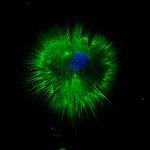Link to Pubmed [PMID] – 38569551
Link to DOI – 10.1016/j.devcel.2024.03.013
Dev Cell 2024 Apr; ():
Macrophages constitute the first defense line against the non-self, but their ability to remodel their environment in organ development/homeostasis is starting to be appreciated. Early-wave macrophages (EMs), produced from hematopoietic stem cell (HSC)-independent progenitors, seed the mammalian fetal liver niche wherein HSCs expand and differentiate. The involvement of niche defects in myeloid malignancies led us to identify the cues controlling HSCs. In Drosophila, HSC-independent EMs also colonize the larva when late hematopoiesis occurs. The evolutionarily conserved immune system allowed us to investigate whether/how EMs modulate late hematopoiesis in two models. We show that loss of EMs in Drosophila and mice accelerates late hematopoiesis, which does not correlate with inflammation and does not rely on macrophage phagocytic ability. Rather, EM-derived extracellular matrix components underlie late hematopoiesis acceleration. This demonstrates a developmental role for EMs.





